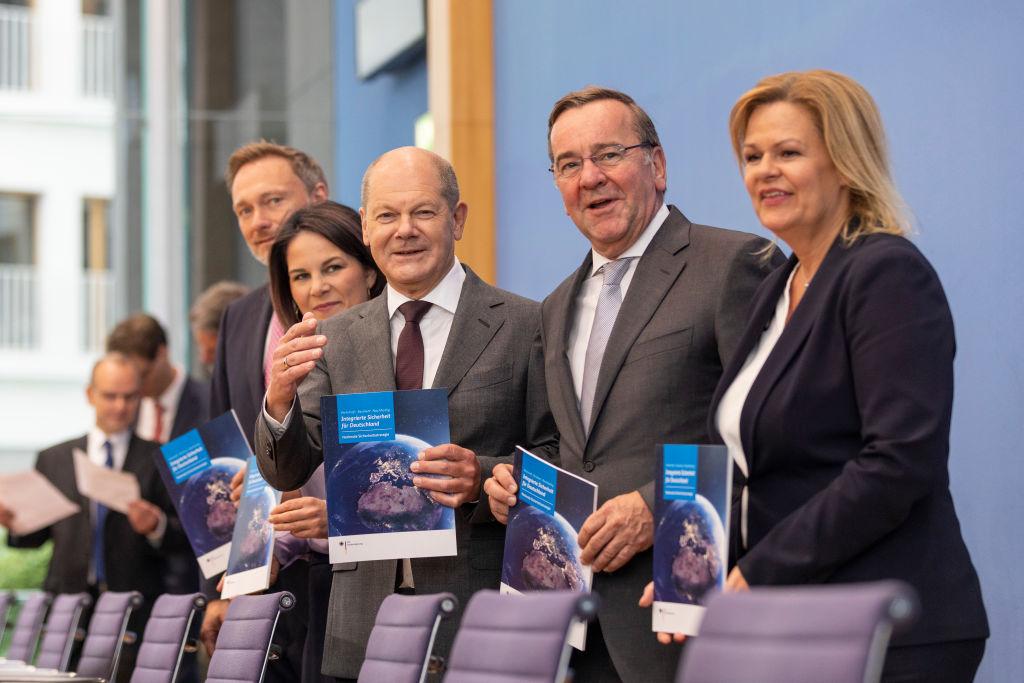Australia must act now to develop a national security strategy
Posted By Adam E. MacAllister on December 14, 2023 @ 06:00

Urgency is mounting for Australia to reintroduce the national security strategy into its strategic arsenal and Prime Minister Anthony Albanese’s recent visits to the United States and China present an opportunity for doing so.
The introduction of an NSS is justified by matters of principle and function, though critics will always emphasise flexibility, concerns over relevancy and the dangers of getting it wrong. Governments must weigh the pros and cons, but they should also look at the wider context and consider the governments that have chosen to, or not to, employ an NSS as a means of conveying their nations’ grand strategies.
Two-thirds of the top 50 global powers [1] by GDP produce an NSS or equivalent policy document. Eighty per cent of those ranked in the top 15 have an NSS; Australia (which ranks 14th), India (5th) and Brazil (9th) are the outliers.
Focusing on those major powers that either don’t produce an NSS or don’t make it publicly available, it becomes clear that population size and geographic region have less bearing on the decision than the characterisation of the government and its political approach.
Australia is one of 20 in the top 50 nations by GDP whose population ranking falls below the 50 most populous countries, but half of them produce an NSS. Similarly, half of the 16 Indo-Pacific nations in the top 50 have an NSS.
Based on the 2022 Democracy Index [2], Australia is one of the 19 full democracies (as opposed to flawed democracies, authoritarian states or hybrids) in the top 50 nations by GDP. Again, 80% of them have a public-facing NSS or equivalent. One of the four outliers (Ireland) has had an NSS under public consultation since 2019. At the other end of the government spectrum, among the eight authoritarian regimes in the top 50, just 50% have an NSS and only Russia’s is publicly accessible.
A commonality among many non-NSS producing governments is affiliation with the Non-Aligned Movement [3]. Created in 1961, the intergovernmental organisation is an enduring vestige of the Cold War. Among the top 50 nations by GDP, 17 are members and three are observers, and 65% of the countries without NSSs come from this subset of nations.
Though Australia is not a member of the Non-Aligned Movement, this commonality warrants further consideration. All nations are wrestling with the realities of the current geopolitical environment where bipolar constructs (such as US–Russia, east–west, north–south or democracy–authoritarianism) are less useful than multipolarity models, particularly when applied to the Indo-Pacific region.
Reflective of this, 80% of the public-facing NSSs note in varying ways the implications of China’s rise, with most conveying it through the lens of US–China competition. Interestingly, the prophetic 2012 writings by Indian leaders on ‘nonalignment 2.0 [4]’ noted: ‘China will, for the foreseeable future, remain a significant foreign policy and security challenge for India. It is the one major power which impinges directly on India’s geopolitical space.’
To varying degrees, this new geopolitical reality has served as the catalyst for several nations to produce their first-ever NSS. Examples include New Zealand, Vanuatu, Germany, Belgium, Ghana and Pakistan. When releasing his government’s strategy in August 2023, New Zealand Prime Minister Chris Hipkins commented [5]: ‘The domestic and international security environment has changed and our preparedness needs to change too.’ At the launch of Belgium’s NSS in December 2021, Prime Minister Alexander De Croo said [6]: ‘We must have a clear and detailed vision that focuses on the threats and the risks to the vital interests of our country.’
The call for an Australian NSS isn’t novel; Ben Scott [7] and the late Jim Molan [8] have provided particularly lucid arguments. Prominent among narratives are the imperative to respond coherently to global disorder, address malign Chinese behaviours, and enable a robust national security dialogue among the public, industry and international partners. To those I would add managing competition, enabling prudent cooperation and facilitating an effective deterrence policy.
The 2023 defence strategic review [9] says that Australia is facing the greatest risk to its interests in decades. It discusses the impacts of multi-domain competition, large-scale conventional and non-conventional military build-ups, rising tensions, reduced warning time, climate-change-induced amplification of challenges, economic coercion and other factors influencing Australia’s strategic environment.
The DSR will certainly inform the development of the 2024 national defence strategy, as well as the next defence strategic update and force structure plan, but an NSS is necessary to action the imperatives outlined in the DSR. The DSR reinforces that approach: ‘Critical to this whole-of government National Defense approach is to have a national strategy and unity of effort to Australian statecraft.’
Albanese’s October visit to Washington and November visit to Beijing create a strategic messaging opportunity for the government. Acting on the DSR recommendation by publicly announcing the initiation of the NSS development process would assure domestic and international audiences that the veracity of the future strategy is enabled by the highest levels of political engagement—particularly in view of the needed rebalance from the one-dimensional pro-China strategy that was conveyed in the Gillard government’s 2013 NSS [10].
As complicated as it is critical, few government initiatives compete with the NSS for its ability to unify a national security architecture, protect and advance vital interests, reinforce sovereignty, provide regional influence, and address directly the leading sources of strategic concern and uncertainty.
Article printed from The Strategist: https://aspistrategist.ru
URL to article: /australia-must-act-now-to-develop-a-national-security-strategy/
URLs in this post:
[1] top 50 global powers: https://worldpopulationreview.com/countries/by-gdp
[2] 2022 Democracy Index: https://www.eiu.com/n/wp-content/uploads/2023/02/Democracy-Index-2022_FV2.pdf?li_fat_id=f1fbad7e-a282-4b9e-9f8f-6a6d5a9fe6b8
[3] Non-Aligned Movement: https://www.worlddata.info/alliances/non-aligned-movement.php
[4] nonalignment 2.0: https://cprindia.org/wp-content/uploads/2021/12/NonAlignment-2.pdf
[5] commented: https://defsec.net.nz/2023/08/04/national-security-strategy-released/
[6] said: https://www.premier.be/en/belgium-adopts-national-security-strategy
[7] Ben Scott: https://www.lowyinstitute.org/publications/sharper-choices-how-australia-can-make-better-national-security-decisions
[8] Jim Molan: https://www.defenceconnect.com.au/key-enablers/8808-what-does-it-all-mean-and-what-can-australia-do
[9] 2023 defence strategic review: https://www.defence.gov.au/about/reviews-inquiries/defence-strategic-review#:~:text=The%20Defence%20Strategic%20Review%20sets%20the%20agenda%20for,and%20comprehensive%20process%20for%20long-term%20and%20sustainable%20implementation.
[10] 2013 NSS: https://apo.org.au/sites/default/files/resource-files/2013-01/apo-nid33996.pdf
Click here to print.